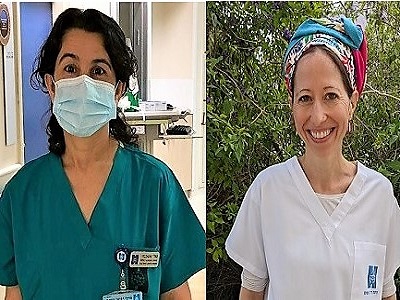
Two extraordinary Hadassah Medical Organization nurses, Shelly Ashkenazy and Avigail Damri were recognized as Nurses of the Year by Israeli President Reuben Rivlin at a ceremony last month at the President’s House.
Ashkenazy wears many hats at Hadassah: intensive care nurse, Hadassah Hospital Ein Kerem trauma coordinator, liaison to the Israel Defense Forces for training medics and paramedics, trainer and nurse in the COVID-19 Outbreak Unit, and Ph.D. student. Damri is a nurse in the hospice at Hadassah Hospital Mount Scopus. During the pandemic, she worked around the clock bringing a unique project to Hadassah’s COVID-19 patients.
When COVID-19 hit last year, Shelly Ashkenazy volunteered to treat patients in the outbreak units and train medical personnel before they joined the fight against the coronavirus. She also took on responsibility for the IDF training program, one-day to week-long sessions for medics, and two-week trainings for paramedics.
“One of the problems training medics in the IDF is that the trainees rarely if ever, get to see actual serious injuries,” Ashkenazy explains. “The same goes for their instructors. We bring in a group of instructors for a week and expose them to patients with complicated injuries. We teach them what they should do if they need to bring in a patient and how to describe an injury. They visit departments and hear from the nurses. They watch their first surgery. So far, no one has fainted. It prepares them for what they’ll see in the field.”
“They don’t want to leave. They would sleep here if they could. At the end of their week, we hear them say, ‘I want to be a nurse,’ or, ‘I want to be a doctor’ or a social worker. We’re training a new generation in best practices for implementation both in the field and here at Hadassah.”
Avigail Damri created a project in which patients added personal stories and life experiences to their usual medical intakes.
Says Damri, “It enabled the patient to reflect, to relive their happiest moments and to share, but it also helped us to know the person in front of us. They became real. At the end of every staff meeting, one of us would spend five minutes telling the story of a patient.”
Damri came relatively late to nursing after a career in occupational therapy. She joined Hadassah eight years ago. “I found myself increasingly drawn to those who required palliative care,” she says.
She finds solace in religion and uses her deep belief when speaking to patients and their families, particularly in end-of-life conversations.
“I couldn’t love my profession any more than I do,” she emphasizes. “It’s a great privilege just to be here. I really don’t need to do anything, just smile, in order to be significant, to change something.”
